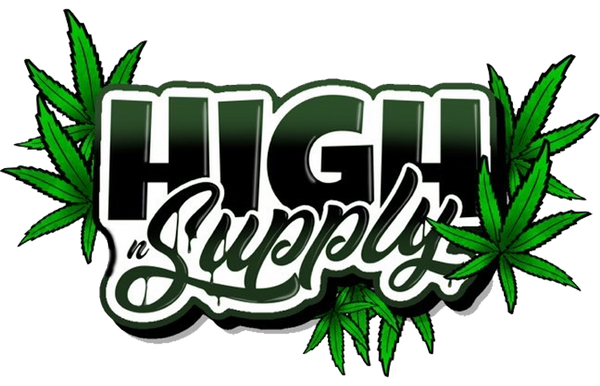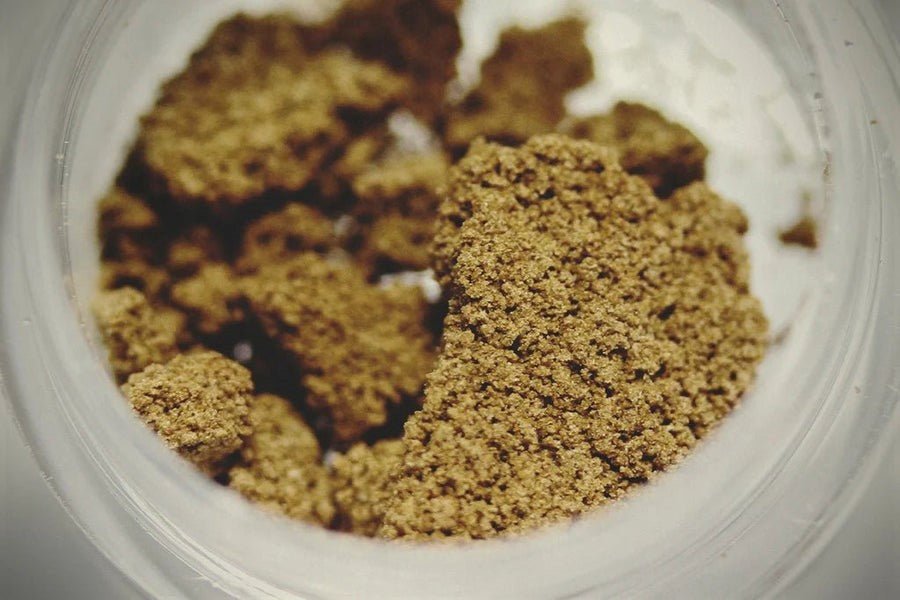The CBD sector has effectively dispelled outdated and inaccurate beliefs about the cannabis plant, yet confusion persists. One prevalent source of uncertainty revolves around distinguishing between weed and hash. The frequent query, "Is hash stronger than weed?" prompts the need for clarification.
In the ensuing paragraphs, we aim to dispel common misconceptions about weed and hash, empowering you to make informed choices as you navigate the swiftly evolving hemp and cannabis market.
Is CBD Hash an illicit Drug?
No, CBD hash is not an illegal substance. It is a type of cannabis product derived from the trichomes of the hemp plant, characterized by high levels of CBD (cannabidiol) and minimal amounts of THC (tetrahydrocannabinol), the psychoactive component in cannabis.
CBD hash is not classified as an illicit drug because it lacks psychoactive effects. It is commonly employed for its therapeutic advantages, such as pain alleviation, anxiety reduction, and sleep enhancement.
Nevertheless, it is crucial to acknowledge that CBD hash is still categorized as a cannabis product and may be considered illicit in certain countries. It is imperative to familiarize yourself with the laws in your region before purchasing CBD hash.
Regarding potency, hash generally surpasses weed, especially when of high quality. The strength of hash varies based on the production method and the cannabis strain used. The US Drug Enforcement Administration (DEA) highlights that a single drop of hash oil is approximately equivalent to one marijuana joint.
As hash is a more concentrated form of cannabis, individuals new to it should exercise caution during initial consumption. Depending on the source, it may contain higher levels of THC and CBD than one is accustomed to.
Emphasizing the importance of obtaining hash from a reputable source, without such assurance, there is no certainty regarding the quantities of THC, CBD, and other active cannabis components present.
Certainly, in the UK, traditional THC hash is deemed an illicit substance, and we neither endorse nor recommend its consumption nor that of any product containing illegal levels of THC, such as hash joints. At HighNSupply, our CBD hash derives from industrial hemp plants, is entirely non-psychoactive, containing no more than 1mg THC per packaged product, and is not intended for the administration of controlled substances to humans or animals.
While we do not advocate THC use for psychoactive purposes, we recognize its potential medical benefits in specific circumstances. This article, authored by a third party, serves an informational purpose only. Further information on this topic is available here.
How is hashish produced?
Hashish, originating from the Middle East, is crafted by extracting resin from cannabis trichomes, also known as "crystals." Trichomes, resembling white, hair-like glands on mature female cannabis flowers, play a crucial role as they contain the resin housing THC, CBD, and other key compounds.
The process of hash production typically begins with separating and isolating trichomes from the rest of the plant material. This can be achieved manually, through sieving, machinery, or even ice water. HighNSupply employs advanced extraction techniques that limit Delta-9 THC while preserving other essential cannabinoids and terpenes, which are not controlled substances.
Various types of hash exist:
Bubble hash: In the case of "bubble hash," isolated trichomes are frozen, dried, and pressed into bricks, often called "cakes." At this stage, the hash is ready for consumption, typically through a pipe or cigarette, and can also be incorporated into edibles like cookies or brownies.
Dry sift hash: Dry sift hash involves filtering dried cannabis flower buds through a sieve, separating resin glands from unwanted plant matter. High-quality dry sift hash undergoes multiple filtration rounds until the resin resembles powder, which can then be pressed or added to marijuana for increased potency.
Appearance and texture serve as reliable indicators of premium-quality hash. Dry sift hash typically exhibits a reddish-brown hue, though variations may include a yellowish tint.
Hand-rubbed hashish typically displays a darker color palette, ranging from deep brown to black. Notably, hash should not exhibit a green hue, as this suggests an excessive presence of plant matter.
Texture is a key aspect to observe. Premium-quality hash is characterized by a solid, dense composition that is slightly sticky to the touch without being overly so. It may manifest as crumbly or oily. Excessive dryness signals inadequate storage conditions.
Certainly. CBD hash can offer a diverse range of flavors, influenced by the cannabis strain used and the extraction method.
Black CBD: Black CBD hash, with its dark, nearly black color, is crafted from various cannabis strains, often favoring Indica varieties. Known for a robust, earthy flavor reminiscent of soil or mushrooms, Black CBD hash boasts high CBD levels, typically ranging from 20% to 30%. It is a preferred option for those seeking a potent and flavorful CBD product with elevated CBD concentrations.
Hash oil: Hash oil, or liquid hash, originates from the same resin as traditional hash but is commonly extracted using solvents like high-proof alcohol or glycerin. The color and consistency of hash oil can vary significantly.
CBD Hash Flavors:
- Citrus: Linked with hash made from Sativa strains, this flavor offers a sharp, refreshing taste reminiscent of lemons or oranges.
- Earthy: Associated with hash made from Indica strains, this flavor delivers a rich, earthy taste akin to soil or mushrooms.
- Spicy: Tied to hash made from Hashish strains, this flavor provides a sharp, peppery taste reminiscent of black pepper or chili peppers.
- Sweet: Commonly found in hash made from Afghani strains, this flavor imparts a smooth, mellow taste reminiscent of honey or maple syrup.
In addition to these common flavours, there are also a variety of more exotic flavours of CBD hash available, such as:
- Chocolate: This flavour is made by adding cocoa powder to CBD hash. It has a rich, chocolatey taste that is perfect for chocolate lovers.
- Vanilla: This flavour is made by adding vanilla extract to CBD hash. It has a smooth, vanilla flavour that is perfect for those who enjoy sweet treats.
- Coffee: This flavour is made by adding coffee grounds to CBD hash. It has a rich, coffee flavour that is perfect for those who need a caffeine boost.
- Fruit: This flavour is made by adding dried fruit to CBD hash. It has a sweet, fruity flavour that is perfect for those who enjoy a fruity treat.
Assessing the Potency Discrepancy between Cannabis Hash and Flower
Whether you opt for hash or marijuana, the potency is typically gauged using the same criteria: THC and CBD levels. As THC is the primary psychoactive compound in cannabis sativa, and CBD is the primary non-psychoactive compound, along with CBD and terpenes, THC plays a pivotal role in determining how various strains impact users.
Popular cannabis strains generally contain 15-20% THC and 1-4% CBD. In contrast, hash frequently boasts over 30% THC and up to 12% CBD. A 2016 study revealed significant variations in CBD levels in hash based on the country of origin, ranging from 0.78% to 12%. Consequently, hash is considerably more potent than flower.
Identifying the Most Potent Form of Hash
No single type of hash reigns supreme in terms of potency; it hinges on two main factors: 1) the THC and CBD content of the chosen strain and 2) the extraction method. A superior extraction process results in a more refined resin, yielding more potent hash. The goal is to eliminate as much extraneous plant material as possible, including Delta 9 THC in our case. This can pose a challenge for novice extractors.
It's essential to note that hash derived from younger cannabis plants typically contains higher concentrations of cannabinoids. Additionally, since cannabinoids degrade over time, fresh hash tends to be stronger than hash stored for an extended period.
Terpene Levels: Hash vs. Weed and Flower
Similar to other hemp or cannabis concentrates, hash contains various additional compounds, with terpenes being particularly noteworthy. Terpenes contribute to the overall effects of a cannabis product, and their quantity in hash varies.
Terpenes, aromatic compounds responsible for the distinctive scent and flavor of marijuana, undergo a transformation when hemp or cannabis flower is converted into hashish, resulting in the emergence of a previously unidentified terpene termed "hashishene." This obscure terpene is believed to contribute to the unique earthy aroma associated with pure Moroccan hash.
Exploring the Effects and Benefits of Hash CBD on the Brain
CBD hash, a cannabis product rich in CBD and low in THC, exerts various effects on the brain, both direct and indirect.
Directly, CBD hash resin engages with the endocannabinoid system, a network of receptors dispersed throughout the body that regulates functions such as pain, mood, and appetite. CBD hash can bind to these receptors, modulating their activity, potentially yielding effects like pain relief, anxiety reduction, and improved sleep.
Indirectly, CBD hash interacts with other neurotransmitters, such as serotonin and dopamine, influencing mood, sleep, and pain perception. CBD hash may contribute to the regulation of their activity.
While the effects of CBD hash on the brain are intricate and still under study, it appears to have the potential as a safe and effective treatment for various conditions.
Key Effects of CBD Hash on the Brain:
- Reduce Inflammation: CBD hash may assist in lowering brain inflammation, potentially enhancing cognitive function and offering protection against neurodegenerative diseases.
- Increase Neurogenesis: CBD hash might stimulate the growth of new neurons in the brain, potentially enhancing memory and learning.
- Reduce Anxiety: CBD hash could potentially alleviate anxiety by binding to GABA receptors in the brain, a neurotransmitter involved in calming the brain.
- Improve Sleep: CBD hash may contribute to better sleep by regulating melatonin production, a hormone that governs the sleep-wake cycle.
- Reduce Pain: CBD hash may aid in pain reduction by binding to TRPV1 receptors in the brain, which are linked to pain perception.
It is crucial to note that these are potential effects, not established medical claims. More scientific research is required to comprehensively understand the mechanisms and full spectrum of effects of CBD hash on the brain.
Additional Potential Benefits of CBD Hash
Alleviates inflammation: CBD hash may assist in reducing inflammation within the brain, potentially enhancing cognitive function and providing protection against neurodegenerative diseases.
Enhances sleep: CBD hash may contribute to improved sleep by regulating melatonin production, a hormone crucial for maintaining the sleep-wake cycle.
Eases pain: CBD hash may alleviate pain by binding to TRPV1 receptors in the brain, which are instrumental in the perception of pain, potentially aiding in the reduction of their activity.
Impacts on blood pressure: CBD hash has demonstrated a stabilizing effect on blood pressure, benefiting individuals with both high blood pressure and those maintaining a normal heart rate.
Considerations for mental health: It is essential to note that CBD hash can interact with specific medications, necessitating consultation with a healthcare professional before use. Additionally, potential side effects, such as drowsiness and fatigue, should be acknowledged.
HighNSupply CBD Hash vs. HighNSupply CBD Flower: Determining Potency
At HighNSupply, we specialize in crafting pure, high-quality CBD products compliant with current regulations, offering both CBD hash and CBD flower. Both variants are rich in CBD, providing a comprehensive range of desired effects for consumers.
Rest assured, our offerings guarantee top-tier CBD sourced ethically from the finest organic hemp flowers.

